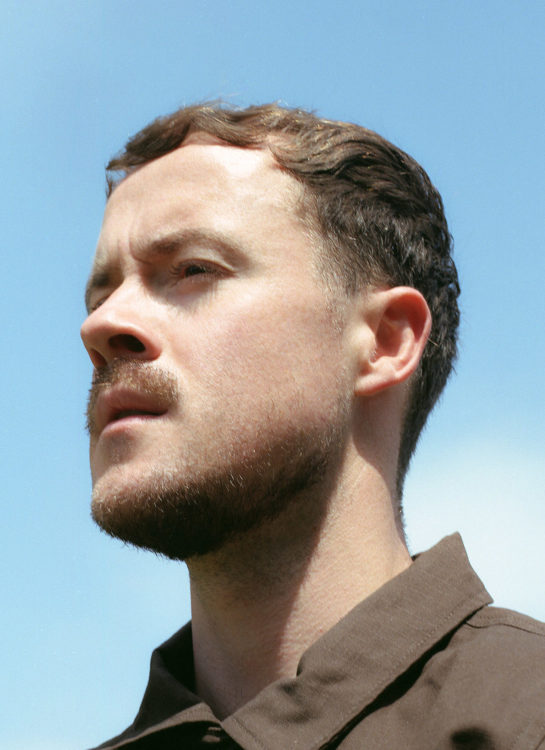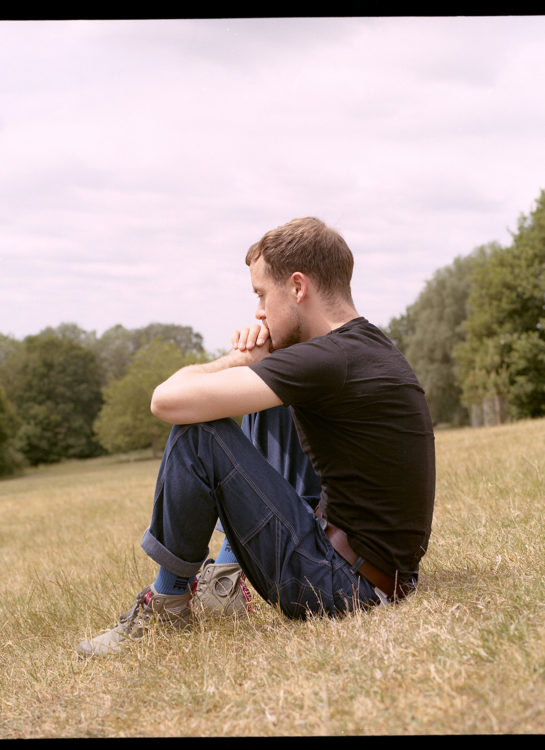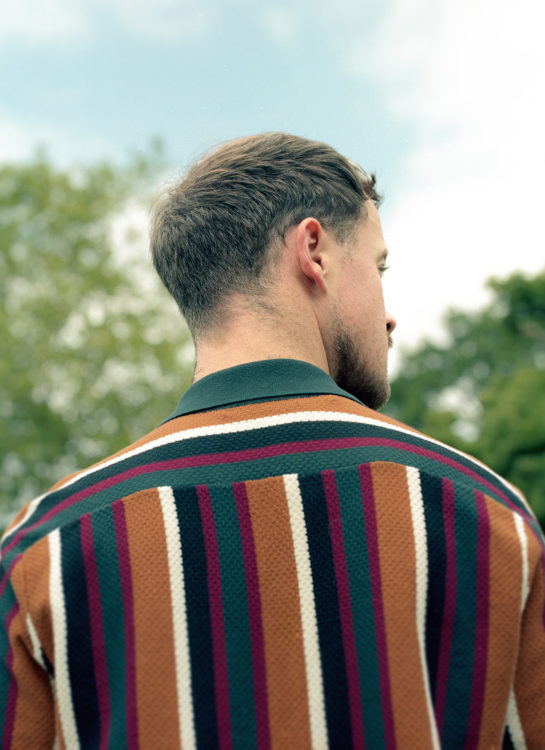- Words Aimee Phillips
- Photography Cal McIntyre
- Production Studio Notion
As in his music, Maverick Sabre speaks with pure passion and honesty. In this interview, he opens up about his new single "Signs," his penchant for overthinking, and reflects on the lessons he's learned.
After more than a decade in the music industry and with three albums and a whole shelf of collaborations under his belt (including Chase & Status and Jorja Smith) Maverick Sabre has dabbled in everything from rap and R&B to reggae, folk and drum and bass.
Born in the London Borough of Hackney, Maverick then relocated to Ireland as a child, later returning to London to pursue a career in music (after instructions from fellow musician Plan B). In the 12 years he’s been on the scene, Maverick has solidified his position as a highly respected voice; someone whose music explores many of life’s greatest questions around society, love, loss, hope, and turmoil.
Whilst the singer, storyteller and social commentator is known for his anthemic songs and powerful voice, his new music marks a shift in direction for him sonically. Whilst before, Maverick would use the strength of his vocals as the focus, his latest single, “Signs,” is a lot softer. The track has already been proving immensely popular with his fans and getting a ton of radio play – and it’s easy to see why. The song begins with a delicate, slightly eerie soundscape, but as the bass builds, Maverick’s crackling, bluesy vocals materialise. It’s simple but still so powerful.

- Jacket Artist's Own

- Top Scotch & Soda
- Trousers Artist's Own
- Socks Burlington
- Shoes Palladium
Maverick’s forthcoming EP, ‘You Know How It Feels’ is due for release on 24th July. The title alone encapsulates much of what the musician is all about. He’s deeply introspective and emotionally candid – both in his songs and in this interview. He has this incredible ability for unpicking powerful, thought-provoking topics with a gentle touch. Sonically, the EP is a continuation of his 2019 album ‘When I Wake Up,’ but as we learned from our chat, he was keen to experiment and expand his sound in the upcoming release.
The concept of the EP is based around the “four moments of inner processing, overthinking and questioning that we take on and never let go of.” On “Signs,” in particular, however, the focus is on overthinking – something the musician admits often plagues him. But as time has passed, he’s learnt how to harness his racing mind and turn the bolting thoughts into something beautiful.
We spoke with Maverick Sabre about everything from the fluctuation of creativity he’s experienced during lockdown to what he’s learnt about himself over the years.


- Jacket Artist's Own

- T-Shirt Artist's Own
How have you been doing over the past few months?
The last few months have been big different waves. When it [lockdown] first started, it was just mad inspiring. The first three weeks I was the most inspired I’ve been in a long while; offloading things I’d been putting off. My fresh output – stuff that I was creating brand new every night – was just so much more than I’ve been doing in the past few months. Then it went in a dip and then it came back out… now I’m in the middle ground where I’m mad inspired still but I’ve become a bit complacent the last couple of weeks. It’s a weird one. I think it’s the same for a lot of people. Waves of needing to be around people and then enjoying not being around people.
How would you best describe the new sound you’re leaning towards on your latest single “Signs”?
For me, it’s more of an extension from the last record. I wanted to make something that would expand my sound a bit. Really, I was just having fun; I was experimenting. In the last couple of years I’ve been struggling in different ways. This EP [the upcoming You Know How It Feels] is one of the moments where my mind went off in that space. From start to finish on the first four tracks it’s almost a different world altogether. We’re creating a visual around it that’s gonna have like four short stories. The song will make more sense when you see the visuals on top of it.
What is the visual language for the new work?
At the moment, it’s breaking down mental barriers in a modern world. Questioning different topics, from love to ego to the way we treat our young generation; what we haven’t questioned. There’s a lot of things the younger generations now are questioning – from the makeup in society, from how we think about ourselves, how we talk about ourselves, how we pressurize the rest of society into conforming into something that we don’t even know if we want.
What have you learned about yourself through this journey?
I suppose it’s a never-ending journey, really. For me, as well as telling the stories of society I see around me, they’re also massively personal stories. For me, it’s the same level to every record I put out.

- T-Shirt Artist's Own
- Jeans Lee
- Socks Burlington
- Shoes Palladium

- Top Scotch & Soda
You’ve been in the music industry for a while now. Has your creative process changed throughout the years?
I think more now, which sometimes is a good thing, and sometimes definitely not a good thing. You gain experience as you grow up, you land on your ass more and you care more in a sense about your output because you’ve learned more. Being an almost mental overthinker anyway, sometimes for me that’s great, because it forces me to be a perfectionist, but it can force me to overthink so much that I move on from an idea. I knew what was coming, I knew what I liked, but I didn’t have any outside thought about what I needed to change. I just thought, I like it, and I wrote it quickly, so I’ll bang it out.
Do you have any routines or tricks you use when you’re in that mindset of overthinking?
I have to go back to making beats. I’ll just start making a garage beat or a boom bat beat, or just hit down on the guitar and zone out for a minute. I’ll stop singing or stop writing in that sense. Normally it’s just making beats; I’ll just switch off if I get clogged up making a song. I forget everything and I go into the motion of it and it brings me back to the song.
What would you say to younger people who are looking to follow in similar footsteps to yourself?
Make sure you’re your own biggest fan. If there’s anything to be learnt from years of going through labels and independents and touring and the whole thing. All music is subjective really. You might absolutely adore something, play it to your three closest friends and they might never get it, but there could be a whole fanbase of people out there who understand that song just like you. And that’s not to say that your opinion is overall the 100% right thing, we all have to make absolute shite, you know what I mean [laughs]. Before we give the power to anyone else’s opinion, make sure your own opinion is solid first. The only outside opinions are the ones you trust. Make the shit you love and believe in it.
Your music is a mixture of you looking inward and outward – when you have a track out there, is a release for you or does the topic still stick in your mind?
For me, its funny because you could listen to a song thousands of times before its ever released. Normally for me, by the time a song comes out, that’s the last time I’ll ever listen to it until I perform it. Performing it can potentially bring you back into that place, but it almost goes back in to clean out. I build up that energy to bring the same feeling in the song, but as I do it, with every song, it clears out that part of my mind or my soul that still feels something for it. That’s a therapy in itself.
How would you describe “Signs” in your own words?
I suppose that track is openly talking about relationships – not just while you’re in it but the tail end of relationships that I think highlight a lot of what we’re lacking. Normally we end up holding on to something that’s not right, so it’s all these dependencies that we’re not sure where they came from. It’s either your something from your own insecurities that you need people around you; you need love but it’s not helping. Or it’s just a society thing to keep people in relationships, to keep people married, whatever it is. “Don’t You Know My Now” is kinda questioning that element in myself and having that conversation. What do we stay in things for? What does that highlight in the two people? There’s not to say there isn’t love there, but the moment we stay in things, ask ourselves, who conditioned us to do that?

- Top Scotch & Soda

- Top Scotch & Soda
- Trousers Artist's Own
- Shoes Palladium

